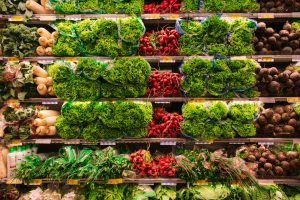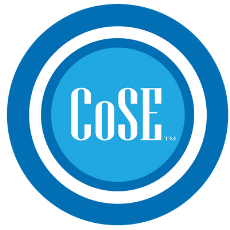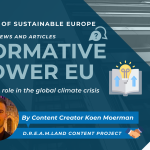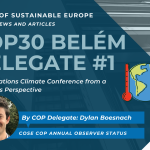Written by Elena Bassoli
Reading time 3 minutes
Corporate Social Responsibility in the European Food Industry: Tackling Food Waste and Promoting Sustainable Practice
Food waste is something everyone should be concerned about. Luckily, some corporations are listening to consumers’ concerns and they are adopting CSR practices aligning with the United Nations Sustainable Development Goals (SDGs), which include ending hunger, ensuring healthy lives, and promoting responsible consumption and production.
The problem of food waste in the EU
The food and drink industry is the EU’s biggest manufacturing sector in terms of jobs and value added and it is also an asset in trade with non-EU countries (Agri-food Industrial Ecosystem, n.d.).
However, a growing number of analyses question the long-term sustainability of the current trends in the production and consumption of food. In the EU, over 58 million tonnes of food waste (131 kg/ inhabitant) are generated annually according to Eurostat 2023, with an estimated market value at 132 billion euros (European Commission, n.d.). Moreover, food waste in Europe is responsible for about 170 million tonnes of CO2 equivalent emissions per year and for significant losses of agricultural land use and resources (i.e. water, energy, and
labor). Additionally, despite the abundance of food in many European countries, food waste exacerbates food insecurity by diverting resources away from those in need.
A leading advisory committee on the future of agriculture, made up of experts from EU Member States (known as the EU Standing Committee on Agriculture Research, SCAR) concluded in their latest report that:
“Many of today´s food production systems compromise the capacity of Earth to produce food in the future. Globally, and in many regions including Europe, food production is exceeding environmental limits or is close to doing so. Nitrogen synthesis exceeds the planetary boundary by factor of four and phosphorus use has reached the planetary boundary. Land use change and land degradation, and the dependence on fossil energy contribute about one- fourth of Greenhouse Gas emissions. Agriculture, including fisheries, is the single
largest driver of biodiversity loss. Regionally, water extracted by irrigation exceeds the replenishment of the resource.”
“Price volatility, access restrictions and the interconnectedness of global commodity markets, as well as the increasing vulnerability of food production systems to climate change and loss of agro-biodiversity, will make food even more inaccessible for the poor in the future.” “The average Western diet with high intakes of meat, fat and sugar is a risk for individual health, social systems and the environmental life support systems. Obesity, type 2 diabetes, hypertension, osteoarthritis, and cancer are wide-spread diet-related diseases. The promotion of a healthy diet also reduces the environmental footprint of food consumption in Europe and globally.” (SCAR Report page 132)

European regulatory framework
The EU is committed to meeting the Sustainable Development Goal Target 12.3 to halve per capita global food waste at the retail and consumer level by 2030 and reduce food losses along the food production and supply chains (European Commission, n.d.).
However,implementing CSR initiatives in the food industry comes with challenges, such as regulatory differences across European countries, high initial costs and the complexity of supply chains.
By means of the European regulatory framework, European institutions play a vital role in harmonising regulation by setting standards, facilitating collaboration among member states and stakeholders and ensuring that regulations are enforced and that businesses adhere to
CSR practices.
Key components of the European regulatory framework include:
- EU Waste Framework Directive (2008/98/EC): This directive establishes a legal framework for treating waste in the EU. It defines a waste hierarchy that prioritizes waste prevention, followed by reuse, recycling, and other recovery methods, with disposal as the last resort. The directive also introduces the “polluter pays” principle, whereby the original waste producer must pay for the costs of waste management (Directive 2008/98 – Waste and Repealing Certain Directives – EU Monitor, n.d.)
- EU Farm to Fork Strategy: As a central part of the European Green Deal, this strategy seeks to rethink the whole food value chain in order to improve its sustainability at each step : from production to consumption (Palace, 2022).
- EU Circular Economy Action Plan: This plan announces initiatives along the entire life cycle of products. It targets how products are designed, promotes circular economy processes, encourages sustainable consumption, and aims to ensure that waste is prevented and the resources used are kept in the EU economy for as long as possible (Circular Economy Action Plan, n.d.).
- EU Regulation on Food Donation (2017/C 361/01): When food waste cannot be prevented at source, surplus food should be redistributed for human consumption where safe to do so ( EU Actions Against Food Waste, n.d.). The EU Regulation on Food Donation (2017/C 361/01) provides detailed guidelines to facilitate food donation within the EU.
- EU Non-Financial Reporting Directive (2014/95/EU): This directive requires large companies to include non financial statements in their annual reports and to disclose information on environmental protection, social, and governance (ESG) factors such as respect for human rights, anti corruption and bribery measures (Non-Financial Reporting Directive (NFRD) – Directive 2014/95/EU and the Proposal for a Corporate Sustainability Reporting Directive (CSRD) | Green Finance Platform, 2021).
- EU Non-Financial Reporting Directive (2014/95/EU): This directive requires large companies to disclose information on environmental, social, and governance (ESG) factors. It aims to increase transparency and accountability, encouraging businesses to adopt more sustainable and responsible practices.
Corporate initiatives and innovations
Many European Companies have adopted CSR strategies to tackle food waste and promote sustainability:
- For instance Danone focuses on sustainability through its “One Planet. One Health” vision, which includes commitments to reduce environmental impact and promote sustainable sourcing. Among the innovative solutions implemented by Danone there are innovative packaging techniques to reduce waste throughout the product life cycle, engagement initiatives with local communities and partnerships with food banks to distribute surplus food products, addressing food insecurity (Less food waste, 2024).
- Also Nestlé has implemented a number of practical, technological and educational initiatives designed to help reduce food loss and waste by 50% by 2030. For instance, Nestlé is enabling farmers in Kenya to use food preservation systems, converting surplus fruit and vegetables that would otherwise spoil into more durable products. Moreover, the brand considers itself as a “Waste Warrior Brand” to help prevent food loss and waste at the consumer level: it does so by trying to educate and raise awareness with stakeholders about food waste reduction and sustainable consumption practices (Nestlé is working to reduce food waste, n.d.).
Conclusion
CSR in the European food industry is essential for addressing food waste and promoting sustainable practices and has therefore an important social dimension. Through their continued innovation and commitment to globally adopted goals and a robust regulatory framework, European food companies bear the responsibility of reducing food waste, ensuring savings for consumers and operators as well as the recovery and redistribution of surplus food that would otherwise be wasted.
The Commission is committed to halving per capita food waste at retail and consumer levels by 2030 and it will set a baseline and propose legally binding targets to reduce food waste across the EU (Farm to Fork Strategy, n.d. ).
 My name is Elena Bassoli, and I am a 20-year-old Italian student pursuing a Bachelor’s degree in Business Administration at KU Leuven University in Brussels. Moving to the heart of Europe was a life-changing decision that has allowed me to immerse myself in an international environment and get closer to the European Institutions. Being a part of this dynamic and stimulating community has laid the foundation of my knowledge in the field of Business and Corporate Social Responsibility.
My name is Elena Bassoli, and I am a 20-year-old Italian student pursuing a Bachelor’s degree in Business Administration at KU Leuven University in Brussels. Moving to the heart of Europe was a life-changing decision that has allowed me to immerse myself in an international environment and get closer to the European Institutions. Being a part of this dynamic and stimulating community has laid the foundation of my knowledge in the field of Business and Corporate Social Responsibility.
I am passionate about driving positive change, which is why, as a creator within the Circle of Sustainable Europe, I aim to raise awareness and promote sustainable practices in the corporate world through my content. It is my firm belief that the future of our planet depends on our ability to make responsible decisions today, and I am committed to doing my part in making it a reality.
References
Agri-food Industrial ecosystem. (n.d.). Internal Market, Industry, Entrepreneurship and SMEs. https://single-market-economy.ec.europa.eu/sectors/agri-food-industrial-ecosystem_en#
Circular economy action plan. (n.d.). Environment. https://environment.ec.europa.eu/strategy/circular-economy-action-plan_en
Directive 2008/98 – Waste and repealing certain Directives – EU monitor. (n.d.). https://www.eumonitor.eu/9353000/1/j4nvk6yhcbpeywk_j9vvik7m1c3gyxp/vitgbgip5dwf
EU actions against food waste. (n.d.). Food Safety. https://food.ec.europa.eu/safety/food-waste/eu-actions-against-food-waste_en
European Commission. (n.d.). Food waste. Food Safety. https://food.ec.europa.eu/safety/food-waste_en#:~:text=on%20the%20webpage).-,About%20Food%20Waste,SWD%20(2023)421).
Farm to fork strategy. (n.d.). In https://food.ec.europa.eu/system/files/2020-05/f2f_action-plan_2020_strategy-info_en.pdf.
Freibauer, A., Mathijs, E., Brunori, G., Damianova, Z., Faroult, E., Girona I Gomis, J., O´Brien, L., Treyer, S., & European Commission – Standing Committee on Agricultural Research (SCAR). (2011). The 3rd SCAR Foresight Exercise: Sustainable food consumption and production in a resource-constrained world. https://wayback.archive-it.org/12090/20151027143728/http://ec.europa.eu/research/agriculture/scar/pdf/scar_feg3_final_report_01_02_2011.pdf
Less food waste. (2024, July 11). One Planet. One Health – Danone. https://www.danone.de/en/impact/Weniger-Foodwaste.html
Nestlé is working to reduce food waste. (n.d.). Nestlé Global. https://www.nestle.com/sustainability/waste-reduction/food-loss-waste
Non-Financial Reporting Directive (NFRD) – Directive 2014/95/EU and the proposal for a Corporate Sustainability Reporting Directive (CSRD) | Green Finance Platform. (2021).https://www.greenfinanceplatform.org/policies-and-regulations/non-financial-reporting-directive-nfrd-directive-201495eu-and-proposal#:~:text=The%20European%20Union%20(EU)%20Directive,of%20employees%2C%20respect%20for%20human
Palace (2022, November 30). EU Farm to Fork – EUROPARC Federation. EUROPARC Federation. https://www.europarc.org/european-policy/farm-to-fork-protectes-areas


